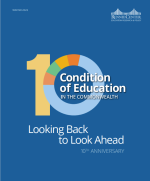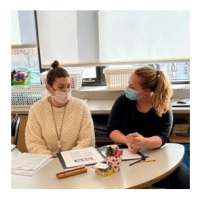A key piece of our Condition of Education in the Commonwealth report, the Action Guide provides research-informed recommendations for statewide actions—policies, investments, and expansion of best practices—that have potential to address performance gaps and contribute to broad improvement in student outcomes. In our recent Condition of Education Action Guides, we've called on the Commonwealth to consider education more holistically, noting that education encompasses more than academic learning.
 2023 Action Guide | Looking Back to Look Ahead
2023 Action Guide | Looking Back to Look Ahead To celebrate the 10-year anniversary of the Condition of Education project, this year's report takes a look back at the programs we've featured in the past and highlights those with particular relevance in our contemporary education landscape. The practices and models highlighted this year fall into four categories: Early Education and Care, Instructional Practices, Student Wellbeing, and College and Career Pathways.
A Time for Change
The ripple effects of the COVID–19 pandemic have placed new demands on schools, students, families, and communities, requiring them to problem solve and adjust instructional practices while responding to unprecedented, ongoing trauma. Despite the fact that the education system has navigated nearly three years of the pandemic, school communities are still managing surging COVID-19 cases, rising absenteeism, mental health and behavioral challenges, and critical academic recovery needs.
These challenges, among many others, have led to increased pressure for Massachusetts school leaders and educators to support students’ development—both academic and social-emotional—all while making critical, strategic investments regarding the $2.9 billion in federal Elementary and Secondary School Emergency Relief (ESSER) funding.
So, rather than releasing a report with a new strategy, or a deep-dive focus on one specific area, we’ve decided that these unprecedented times call for a concise, easily digestible report with research and models for improvement that practitioners and district leaders can implement now. As we simultaneously work to repair the harm done through COVID–19 school disruptions and plan for the future of education, stakeholders in schools and communities will benefit from innovative strategies and urgent action to address students’ academic recovery and wellbeing.
This guide digs into past Condition of Education reports to identify examples of programs and initiatives that meet the moment. The practices and program models highlighted in this year’s retrospective fall into four categories: Early Education and Care, Instructional Practices, Student Wellbeing, and College and Career Pathways. We hope the strategies outlined below offer high-leverage starting points for schools and communities to consider.
Early Education and Care
Provide Accessible & Affordable High-Quality Early Childhood Programs
- Braid public and private resources through collaborative partnerships that build on existing public school and community offerings
- Connect early educators with opportunities for ongoing professional training that align with their schedules and current responsibilities
Support Two-Generation Programming
- Create partnerships that support career pathways for parents and caregivers (such as job training and mentorship) along with learning experiences for young children
Assess Kindergarten Readiness
- Use consistent, locally adapted screeners to determine how schools can best support students’ acclimation and adaptation to the school environment
Instructional Practices
Support Educators
- Empower educators to identify their own learning priorities and provide time and resources for developing appropriate supports
- Establish professional learning groups that are culturally responsive and designed to intentionally connect educators across schools and communities
Adopt High-Quality Instructional Materials
- Select instructional materials using evidence-based sources such as CURATE, an initiative that convenes MA educators to review evidence on curricular quality
Provide After-School and Out-of-School Enrichment
- Connect students with programs that emphasize the importance of social-emotional and academic enrichment, especially when school is not in session
Coordinate Data & Assessment
- Develop a framework bringing together academic results, surveys, school administrative data, and other sources of information to provide a fuller picture of students’ experiences
Student Wellbeing
Develop Comprehensive School Mental Health Systems
- Build a multi-tiered system of support to foster students’ mental health and success across all developmental domains, including social-emotional, behavioral, and academic
Create Holistic Learning Experiences
- Pair children with adults who can help them access tailored supports and opportunities inside and outside of school
Engage & Elevate Student, Family, and Community Voice
- Rather than attempting to develop social-emotional skills in isolation, ensure social-emotional learning is infused within curricular materials, including by adopting curricula that promote student voice and are led by students’ own passions and interests
- Form Children’s Cabinets to bring together local stakeholders to develop a shared and collective vision for supporting children’s learning, healthy development, and wellbeing
College and Career Pathways
Offer Competency-based Learning Experiences
- Shift to more personalized academic programming that enables students to progress based on their mastery of skills and content, not seat time
- Provide opportunities to earn high school and college credits and/or certificates through a variety of in-school and out-of-school learning experiences
Forge Career Pathways
- Support students to chart their own path to a career by exploring their individual skills and interests and how those align with potential professions
- Develop collaborative partnerships with local MassHire boards and employers to offer in-person, virtual, or hybrid options for career exploration, paid internship experiences, participatory assessments, and vocational-technical opportunities
Establish Early College Programming
- Create sustainable systems for partnership between high schools and institutions of higher education to prioritize building early college programs that features equitable access, robust academic pathways, student support, and connections to careers
Local Spotlight
 The report looks at promising approaches to bolster early education, instructional practices, student wellbeing, and college and career pathways. It highlights the innovative work of Boston Universal Pre-kindergarten, Springfield WORKS, Somerville Family Learning Collaborative and Summer Explore, Revere Public Schools' Colleague to Colleague Program, Curriculum Ratings by Teachers (CURATE), Boston After School & Beyond's 5th Quarter of Summer Learning, Carlton Innovation School in Salem Public Schools, Methuen Public Schools, City Connects, Generation Citizen, EdRedesign at the Harvard Graduate School of Education, ACE at Brookline High School, LEAP for Education, and Project Healthcare at Mount Wachusett Community College.
The report looks at promising approaches to bolster early education, instructional practices, student wellbeing, and college and career pathways. It highlights the innovative work of Boston Universal Pre-kindergarten, Springfield WORKS, Somerville Family Learning Collaborative and Summer Explore, Revere Public Schools' Colleague to Colleague Program, Curriculum Ratings by Teachers (CURATE), Boston After School & Beyond's 5th Quarter of Summer Learning, Carlton Innovation School in Salem Public Schools, Methuen Public Schools, City Connects, Generation Citizen, EdRedesign at the Harvard Graduate School of Education, ACE at Brookline High School, LEAP for Education, and Project Healthcare at Mount Wachusett Community College.
